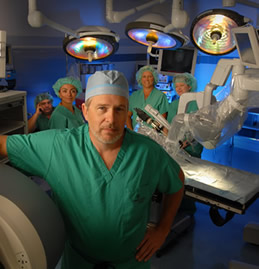Urologic Oncology

Dr. James Jensen has performed more than 1,000 da Vinci kidney, bladder and prostate procedures in his career.
Urologic cancers are those that develop in any organ of the urinary system or the male reproductive system, and they are among the most common cancers. The Edwards Comprehensive Cancer Center's Urologic Oncology Program offers our patients access to:
- A multidisciplinary team of specialists in oncology, surgery, recovery and aftercare
- An individualized plan of care
- Advanced treatment and access to National Cancer Institute-sponsored clinical trials
- Researchers and physicians working toward new methods for preventing, detecting and treating cancer
Common Types of Urologic Cancers
Prostate Cancer
The prostate is the gland below a man's bladder that produces fluid for semen. Prostate cancer is the third most common cause of death from cancer in men of all ages. It is rare in men younger than 40. Levels of a substance called prostate specific antigen (PSA) are often high in men with prostate cancer. However, high PSA levels can also indicate other prostate conditions. Since the PSA test became common, most prostate cancers are found before they cause symptoms.
Bladder Cancer
Bladder cancer is the fourth most common type of cancer in men and the eighth most common in women in the US. Common symptoms include blood in the urine (making the urine slightly rusty to deep red in color), pain during urination, frequent urination or feeling the need to urinate without results. These symptoms are not always signs of bladder cancer; they may also indicate the presence of infection, benign tumors, bladder stones or other problems. If you are experiencing these symptoms, see a doctor so that whatever is causing them can be diagnosed and treated as early as possible.
Kidney Cancer
Your two kidneys, which are fist-sized organs on either side of your backbone above your waist, filter and clean your blood, taking out waste products and making urine. Kidney cancer forms in the lining of tiny tubes inside your kidneys, most often in people over 40. Risk factors include smoking, having certain genetic conditions and misusing pain medicines for a long time. Often, kidney cancer doesn't have early symptoms, but see your healthcare provider if you notice blood in your urine, a lump in your abdomen, unexplained weight loss, pain in your side or loss of appetite.
Urologic Cancer Surgery
 Among the fastest growing surgical services at the Edwards Comprehensive Cancer Center is the daVinci® Surgical Program led by James C. Jensen, MD. He is among the country's most experienced robotic surgeons and has performed more than 1,000 da Vinci kidney, bladder and prostate procedures in his career. His work with the minimally invasive daVinci Surgical System has helped hundreds of patients overcome cancer and quickly return to their normal lives.
Among the fastest growing surgical services at the Edwards Comprehensive Cancer Center is the daVinci® Surgical Program led by James C. Jensen, MD. He is among the country's most experienced robotic surgeons and has performed more than 1,000 da Vinci kidney, bladder and prostate procedures in his career. His work with the minimally invasive daVinci Surgical System has helped hundreds of patients overcome cancer and quickly return to their normal lives.
Using daVinci technology, Dr. Jensen is better able to identify and avoid the muscles and nerves that control sexual function and urination, greatly reducing the risk of impotence and incontinence. Performed through small incisions, da Vinci surgery generally results in shorter hospital stays, less pain, less risk of infection and faster recoveries.
"The advantages of this surgery are enormous for patients," Jensen said. "No longer are patients required to travel long distances to receive the most advanced care and treatment available. This has been a significant milestone in terms of surgical advancement in the Huntington area, cancer treatment and improved quality of life for our patients."
Less Common Types of Urologic Cancers
Testicular Cancer
This disease occurs most often in men between the ages of 20 and 39, and it accounts for only one percent of all cancers in men. Risk factors include having an undescended testicle, previous testicular cancer and a family history of testicular cancer. Symptoms may include a lump, swelling or enlargement in the testicle; pain or discomfort in a testicle or in the scrotum; and/or an ache in the lower abdomen, back, or groin. Diagnosis generally involves blood tests, ultrasound and biopsy. Treatment can often cure testicular cancer, but regular follow-up exams are extremely important.
Penile Cancer
Cancer of the penis is a rare cancer that starts in the penis, an organ that makes up part of the male reproductive system. The exact cause is unknown. Symptoms may include genital lesions on the penis, painless sore on the penis (occasionally, the lesion may cause pain) or penis pain and bleeding from the penis (with advanced disease). A biopsy of the growth is needed to confirm if it is cancer. Treatment depends on the location of the tumor and how much it has spread, but it generally may include chemotherapy, radiation and/or surgery.
Adrenal Cancer
This cancer forms in the tissues of the adrenal glands, which are located just above the kidney). The adrenal glands make hormones that your control heart rate, blood pressure and other important body functions. Although adrenal cancer does not always produce symptoms, patients have reported fever, abdominal mass, a feeling of fullness in the abdomen and/or weight loss.
